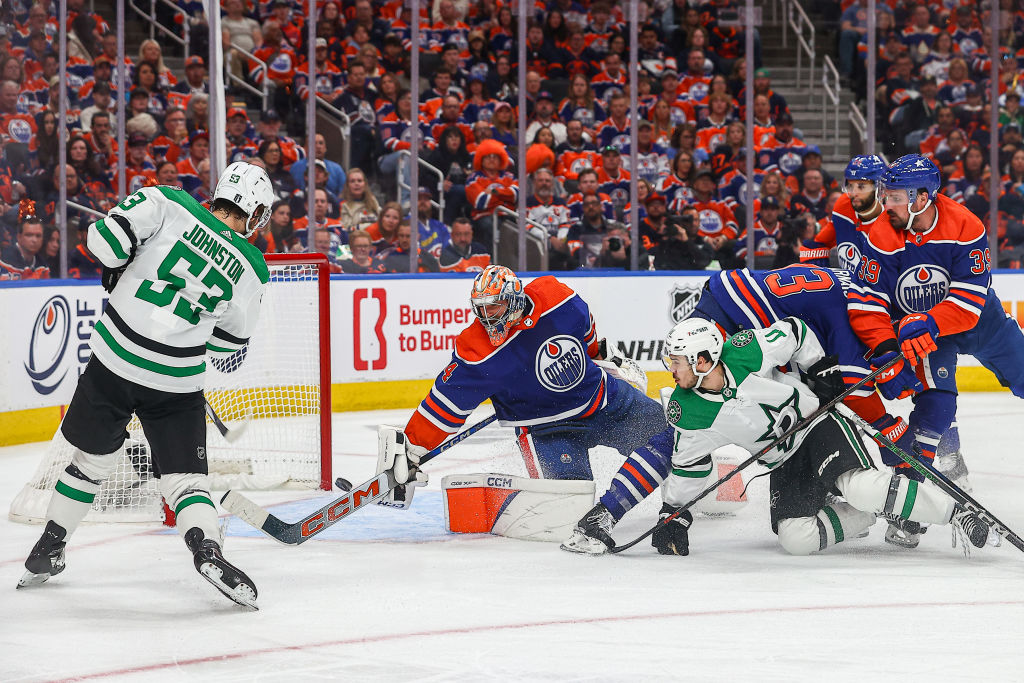This year's conference finals have provided all but the most frail and anxious fans an ideal version of high-stakes hockey action. Comebacks! Overtimes! Tummyaches! As all four teams remaining own legitimate Cup claims, their clashes have consistently featured big momentum shifts and heroic individual performances. But above all, these games have shared one thing in common: The winning team has been the one that's put the puck in the net more often.
I swear I'm not doing a bit. This is just the only way my structure-addicted brain has been able to impose any order on these series. In previous rounds, which boasted more obvious talent imbalances, there was a certain rise-and-fall mechanism to the way these series went down. R.I.P. the blossoming hopefulness of Winnipeg and Vancouver. So long to the Lightning dynasty and Alex Ovechkin's postseason career. Good riddance to the stench of the decaying Avalanche. The World Champion Vegas Golden Knights? Never heard of them. So many narratives, lost like tears in rain. What's left, to me, is pure hockey as hockey, and there is no hockey without the sometimes inexplicable randomness that divides winning from losing.
Let's take Sunday's Rangers-Panthers game, which was awesome. With five minutes remaining, Florida got on a power play with the score tied 4-4. I cannot find any fault with the way they approached this critical juncture. They held possession of the puck, made space with their passes, and challenged Igor Shesterkin in net with quick-release shots. The Panthers were extremely dangerous in this moment, but one thing—really only just the one thing—went wrong: The puck didn't go in the net.
The Rangers took the day and a 2-1 series lead despite being outshot 37-23. They never trailed after the first 7:17, thanks partially to some stunning individual efforts from guys like Alexis Lafrenière, but they got the victory at the end after a deflection simply went their way in overtime. That's a good faceoff win and heads-up hockey by the hero, Alex Wennberg, but still, he took the narrow shaft of a stick and used it to deflect a soaring puck so that it perfectly ricocheted into the corner of a six-by-four net. The Panthers might have had a dozen better chances than that, but their puck didn't go in, and this one did.
Luck again played a starring role in Oilers-Stars Game 3, which turned out to be the very definition of a 50/50 game. Jason Robertson, for example, was in the right place at the right time to receive the puck and finish for the game-winner after it took an impossible-to-predict bounce off the skate of Leon Draisaitl. On the other hand, the Edmonton chance I'm thinking about most is the one that they earned immediately before the Dallas empty-netter. Connor McDavid sent the puck in the direction of the net, low and at speed, and it easily could have swerved through Jake Oettinger's five-hole. But it didn't.

There are a ton of areas a team can address to improve their chances of notching a goal. They can avoid turnovers. They can win faceoffs. They can be smart about their positioning. They can ice an especially sharp goalie. They can be aggressive on the forecheck or be prepared to break out on the backcheck. The game is not entirely without logic.
But these tight contests are a gut-punch of a reminder that the gap between getting close to a goal and actually inching the puck across the line can feel wider than the distance between Florida and Alberta. The Panthers "deserved" to win Game 3, both by the metrics and the eye test. There's a plausible set of circumstances where the Stars-Oilers series plays out almost exactly the same way, but with Edmonton taking all three wins. It's impossible based on the evidence presented to say one team is "better," or to shake the nagging intuition that sometimes we're essentially watching a random-number generator at work. Process and results become more estranged as sample size shrinks. The climactic games of this NHL season should and likely will continue to showcase well-constructed teams with sound fundamentals and steely determination battling to prove their superiority. But there remains an unknowable, uncontrollable force that will play a huge role in whittling four down to one.






